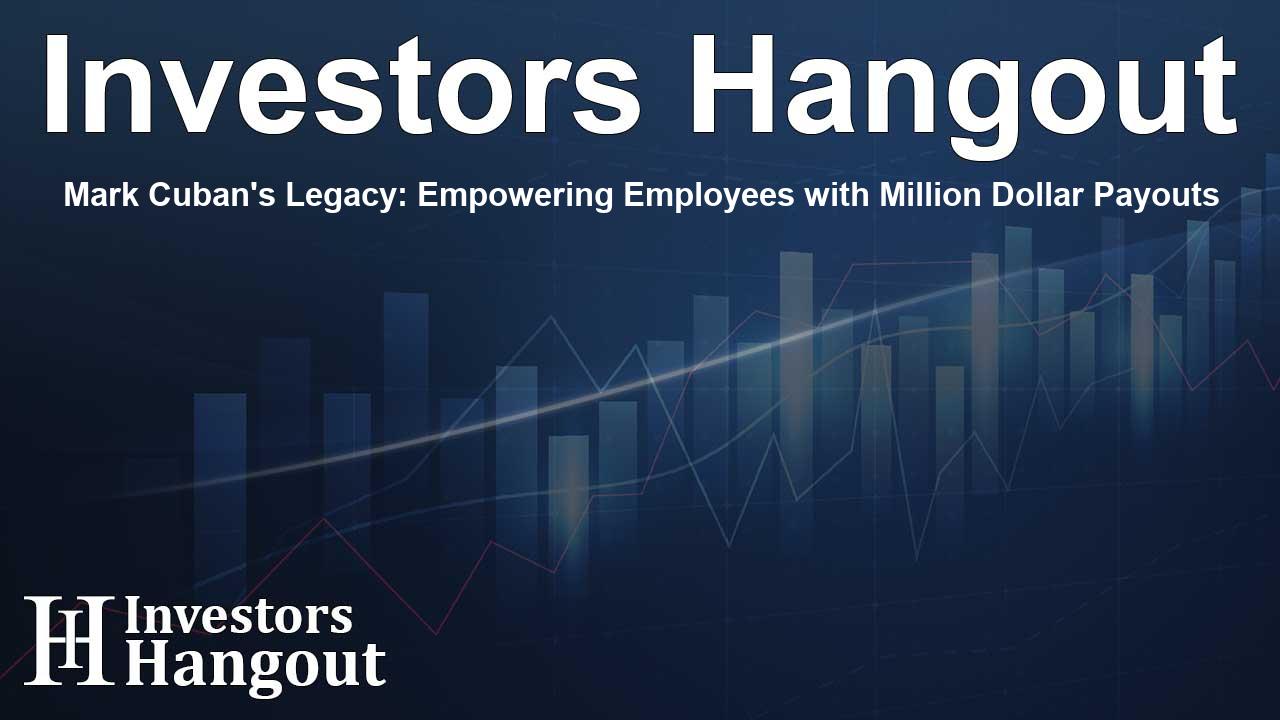Mark Cuban's Legacy: Empowering Employees with Million Dollar Payouts

Mark Cuban's Unique Approach to Wealth Sharing
Mark Cuban, known as a savvy entrepreneur and investor, has developed a powerful reputation not just for his financial acumen but also for how he treats his employees. Echoing the sentiment of sharing success, Cuban's business philosophy has led many of his former staff members to become millionaires. This practice is notable for its rarity and significance in today's corporate culture.
Empowering Employees: A Philosophy in Action
Cuban openly discusses his commitment to paying employees their due upon the sale of a company. When he sells a business, he distributes substantial bonuses to staff who have contributed to the company’s success. His philosophy centers on fairness and respect for those who have devoted time and energy to the organization.
Financial Success Stories
One of his first notable payouts occurred when he sold MicroSolutions. Cuban generously shared 20% of the deal proceeds with employees who had been with the company for at least a year. When the company was sold for $6 million, that amounted to around $15,000 each. Cuban emphasizes that this was not merely an act of kindness but a moral obligation to ensure that employees benefit from their hard work.
Broadcast.com: A Milestone Deal
The story continued to grow as Cuban sold Broadcast.com to Yahoo for an impressive $5.7 billion. In this sale, the proportion of employees who became millionaires reached 91%, with 300 out of 330 team members experiencing life-changing financial outcomes. Cuban's unwavering commitment to sharing wealth has become a cornerstone of his business operations.
Continuing the Tradition
Cuban didn't stop there; he employed his employee-focused tactics during the sale of HDNet and most recently his stake in the Dallas Mavericks. The latter transaction reportedly allocated over $35 million to long-term employees, despite HDNet being the only company where layoffs followed its sale. Cuban's reflections on his business practices underline the importance of valuing team members’ contributions.
Doing the Right Thing
For Cuban, sharing success is a logical extension of creating a thriving company. He believes that wealth should be shared with those who contributed to it. "It's the right thing to do. No company is built alone," he asserts, emphasizing that collaboration and teamwork are critical to achieving success.
A Rare Business Model
What sets Cuban apart is not just his willingness to share wealth, but the transparency and consistency of his approach. Many entrepreneurs talk about employee importance in interviews, but few take tangible action. Cuban's real-world examples demonstrate that generous profit-sharing can motivate employees and foster loyalty, ultimately benefiting the company as a whole.
Final Thoughts
In the landscape of business, Mark Cuban stands out for his dedication to empowering employees. His track record speaks volumes, showcasing how a commitment to sharing success can redefine not just financial outcomes but the workplace culture itself. Employees who feel valued are likely to contribute more meaningfully to their organization’s success. Cuban's legacy will not only be defined by his financial successes but also by the multitude of individuals whose lives have been transformed through his innovative approach to employee recognition and reward.
Frequently Asked Questions
What impact did Mark Cuban's payouts have on employees?
Cuban's policy of sharing a portion of sales proceeds has made many employees millionaires, enhancing their financial stability significantly.
How does Cuban determine bonus amounts?
The bonuses are typically a percentage of the sale, distributed among employees who have been with the company for a certain duration.
Are there any other companies that follow Cuban's model?
While not very common, some companies do share profits or bonuses with employees, though rarely at the scale Cuban does.
Why is this employee payout model unique?
Many business owners do not prioritize sharing wealth, while Cuban’s model is based on fairness and acknowledgment of employee contributions.
How does Cuban’s approach affect company culture?
This approach fosters a collaborative and loyal company culture, motivating employees to work towards common goals enthusiastically.
About The Author
Contact Olivia Taylor privately here. Or send an email with ATTN: Olivia Taylor as the subject to contact@investorshangout.com.
About Investors Hangout
Investors Hangout is a leading online stock forum for financial discussion and learning, offering a wide range of free tools and resources. It draws in traders of all levels, who exchange market knowledge, investigate trading tactics, and keep an eye on industry developments in real time. Featuring financial articles, stock message boards, quotes, charts, company profiles, and live news updates. Through cooperative learning and a wealth of informational resources, it helps users from novices creating their first portfolios to experts honing their techniques. Join Investors Hangout today: https://investorshangout.com/
The content of this article is based on factual, publicly available information and does not represent legal, financial, or investment advice. Investors Hangout does not offer financial advice, and the author is not a licensed financial advisor. Consult a qualified advisor before making any financial or investment decisions based on this article. This article should not be considered advice to purchase, sell, or hold any securities or other investments. If any of the material provided here is inaccurate, please contact us for corrections.
